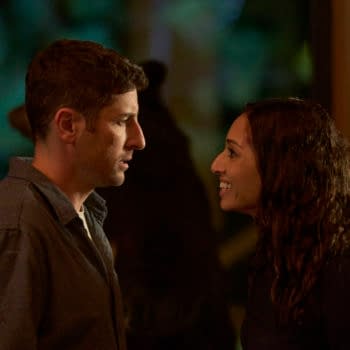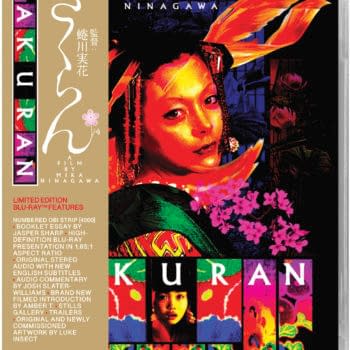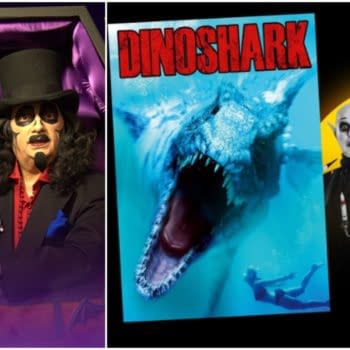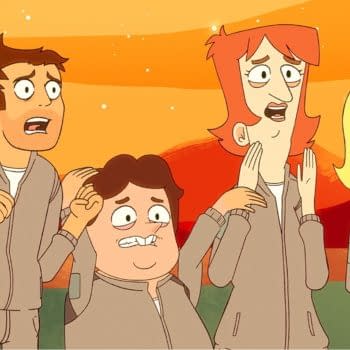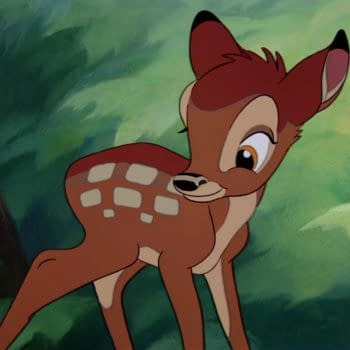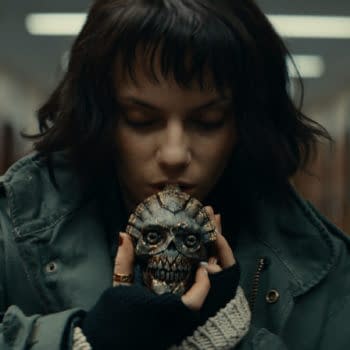Posted in: Movies | Tagged: entertainment, film, machinima, mission impossible, Phil Morris, Real Fake History, Seinfled, smallville
Phil Morris On Seinfeld, Smallville, Mission Impossible And New Webseries
Interviews like this are tough. Not because the person being interviewed is difficult… quite the contrary… the problem is when you have someone who has done so many cool projects as Phil Morris has, you find yourself wanting to ask about all of them and wanting to talk about the newest project. Morris has done everything from playing in the 80's revival of Mission Impossible (a show his father Greg Morris help make famous) to playing John Jones / Martian Manhunter on Smallville to playing Jackie Chiles on Seinfeld. And that is just the tip of the iceberg that is his career.
Morris is the narrator for a new webseries from Machinima called Real Fake History. It's a faux documentary of some of the greatest battles in pop culture history. The first episode, shown below, features The Battle For Endor.
I contained myself with the following eight questions… but I had so many more:
BLEEDING COOL: Your new project with Machinima is the narrator for their new series Real Fake History. What can you tell us about the new webseries? What are some of the topics you'll be covering?
Phil Morris: The new series is very clever and original. It takes the position that all of these great battles, whether in the video game world, or the film world, t.v., etc… actually happened, and if they did, how would the participants, or by-standers/eye-witnesses view it, and report on it? It's done in a very Ken Burns Documentary style, and is quite interesting. We look at worlds like: "The Walking Dead", "Pacific Rim" "Star Wars", etc…
BC: How did you become involved in the project? What was it about the webseries that got you to sign on?
PM: I became involved with the series because of the writer/prod./actor on the piece: Tony Janning. Tony and I met on a wonderful short film we did for The Roddenberry Co. called, "Instant", and it's pretty good. Tony and I were acting in the short, and we hit it off, we became good friends and collaborators. He called me and said that he had written this project, he needed a narrator, and thought of me. He explained the premise and the tone, and I was taken with it. I'm a sucker for pop culture, do a ton of voice over, and I'm a Ken Burns junkie, so it is right up my alley.
BC: The series focuses on famous fictional moments but treated like a documentary of real events. How are you approaching the narration? Is this Phil Morris narrating or are you effecting the style/voice of anyone in particular?
PM: As I said, I'm a big Ken Burns Documentary fan. I'm also a fan of the spoken word, and the great voices in v.o. like my father, Greg Morris, who was probably the first person I consciously knew of, that narrated and was an orator. My father was an incredible presence, and his voice was his trademark. It's interesting, because I've been referencing Keith David, who is an amazing vocal presence, who I've worked with, and know professionally. He also does many Ken Burns narrations, but my father was the inspiration for all of the voice over work that I do. However, in doing this narration, I feel that I'm doing an homage to ALL of those great narrators, who had to convey the integrity of the proceedings, historically and currently. In doing "Real Fake History", the trick was to play that integrity right up to the hilt, then give the wink, or comment, at just the right time, and hopefully it's funny, at the least, amusing and clever.
BC: With how many genre related roles you have had over the years, I'm going to assume that you are a fan as well. From a fan point-of-view, what about this new series is going to get them to watch?
PM: As a fan, and yes, I've been a fan of genre for my whole life. Sometimes I'm curent, sometimes not so much, but it is my go to. When your father starred in arguably the greatest spy team show in television history, virtually creating the genre, that has a huge influence on your life. I love genre, and fans of it. I go to conventions and signings, and have for many years. My take on what fans like is this: If you respect their fandom, and give them things that treat their fan faves with that respect, but bring a fresh take that enhances their passion, they will follow you through the gates of hell. I did "Smallville", playing The Martian Manhunter. In the comic, that character didn't exist in Smallville, but the fans loved him, because he enhanced the product. Real Fake History gives the fan the benefit of the doubt, and says, "ok, if this were really real, how wild would it be if it were like this?!" and the documentary style, married with the narration highlights it, and then, it's funny. The comment on the show or video game, or movie, gives it a place of honor and consideration, fans love that…too deep?
BC: You've done a lot of work in DC Comics related properties between voice work and appearing as Martian Manhunter on Smallville. Starting with that series the company has built a strong foot hold in the TV market. What do you think about the popularity of the DC characters on TV? What do you think it is about that universe that makes it work so well on the small screen?
PM: It's weird how it seems that DC has perfected bringing comics to the small screen, and Marvel/Disney have perfected how to bring them to the big screen. I don't really know the answer to that overall, but I think I understand how they were successful with "Smallville". With "Smallville" they knew that they couldn't make a series last with just comics fans…too small an audience. But they had the perfect love triangle built-in, with Clark, Lana and Lex. They capitalized off of that, brought in a huge young female audience, and kept them, right the way through. They peppered in enough of the Clark's/Tom Welling's powers coming to fruition through his growth as a teenager, to keep the superhero fans. As he matured, he would develop different parts of his abilities. He became the the ultimate example of puberty manifest in a superhero…brilliant. In carrying that forward, they have focussed on the maturation of the hero, which can be sustained through the course of a multi-episode season, with enough visceral, run and jump stimulation from some of the most beloved superoes in all of comics. They are doing it well, and have the technology available to make it very exciting, I can't wait to see what's next.
BC: Your father, Greg, appeared in the classic Mission: Impossible series and you were part of the revival in the 80s. Now it's a film franchise with another big budget entry coming out soon. Do you follow the films and if so, what do you think of what Tom Cruise and company have been doing with the family franchise?
PM: I have gone round and round with this one, and felt one way about it, many years ago, and I have a very different opinion about it now. Back when I had finished my MI, I was upset that it wasn't more well-received, and that we weren't given a real chance to make it a great show. My father was always telling me how their show would always be better than ours, even though he was proud of ME. He was right, but it was still hard to take. So, when Tom came out with the first MI film, I wasn't in a good place to see it. I LOVE the movies now, as a straight action-adventure film based on the original idea of MI. They are kick-ass films. But, at the time, I had a different opinion, some I still hold to, like: I was very upset that he decided to make Phelps the bad guy, if Phelps can be turned, why do I care about anyone else, including Ethan Hunt? Jim Phelps CREATED the team, it was a horrible plot twist, a glaring hole. Also, they do something in the movies, that we did in our version of MI, and we were wrong: We referred to another "branch" of The I.M.F, as though we were working for a McDonald's. There was never another branch in the original, there were only those 5 people who could do what they did, on that level. If they needed someone else, they went and got them. There was no "franchise" IMF, no alternate bureau in Luxembourg. Only 5 people could do this…in the world, THAT'S why it was so amazing! Again, Tom Cruise kills in these films, I love the movies, (even loved MI 2, I'm a sucker for John Woo) and will be in the audience for the next one, but I come with a small amount of expertise on this subject and those are my honest opinions. May the franchise live forever.
BC: You've done a lot of action/dramas, but you also have done comedy including your role of Jackie Chiles on Seinfeld. Do you find yourself drawn to one more than another? Is drama easier than comedy as the old saying suggests.
PM: I don't want to be glib about this, but it's a hard one to answer. I've done both well, and poorly. I like comedy because it's more of my own nature, and I love to see the funny side of life, more than the tragic. However, I'm also a person who is very reflective, and searches for a universal truth, which can be a fairly serious affair. So, it's more character based, for me, when I have the choice. Sometimes I don't, and I make the decision based on the upside of the people I'm working with, who I might work with that might be of interest down the road, and the material. Jackie Chiles allowed me to work on completely different acting muscles/chops, than John Jones in "Smallville". It's hard to say which is more valuable to me as the performer.
BC: And staying on Seinfeld for a minute. Television has changed quite a bit over the last couple decades. Show have to either be a hit immediately or their gone in most cases. Do you think a show like Seinfeld could have made it in today’s television market?
PM: A show like Seinfeld wasn't supposed to work in that market. I was in the office of one of the Castle Rock (the production co. that produced "Seinfeld") execs. and saw the network notes for the first show. They were terrible, almost mean in their criticism of that show when it first came out. No one got it. It was something no one had seen before…it had to be a hit. Yes, I think a show like "Seinfeld" could work, because there is still room for that "there is no spoon" thinking in tv, it's what made the medium, and what will sustain it and entertainment as a whole. If not, we are all in trouble, "no one knows nothin'" -William Goldman.
[youtube]https://youtu.be/yNOBHZ7FYUE[/youtube]










